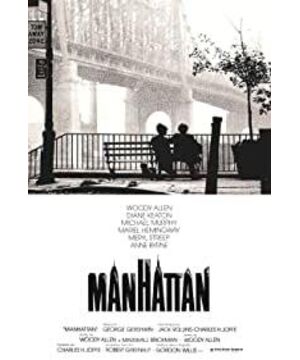This is a story with a very utilitarian ending. Many of Woody Allen's films in the 1970s and 1980s focused on the middle-class intellectual circle of men and women's love, betrayal, going around in a circle and returning to the original point, etc. on the element. For example, the middle-aged couple in "Husband, Wife and Lover" who broke up at the beginning of the movie but finally reconciled. Woody Allen's works often describe the betrayal and narcissism of middle-class intellectuals or artists, and this film is no exception. For example, Woody Allen can't smoke in front of his girlfriend. He said that he only smoked because he looked handsome when he smoked. , but the lungs are not important...... Isaac played by Woody Allen is still a typical Woody Allen character, chatting endlessly, full of names of artists or writers, all kinds of ideas and doctrines at his fingertips, and a very smart Jewish face. But he just couldn't live his little life, especially his love life. A middle-aged intellectual literary man faces a middle-aged intellectual literary woman and another young woman who is not intellectual and not so literary. Which one is a more suitable partner for a man? Woody Allen clearly prefers the former, even though Isaac had a bad impression when he first met Diane Keaton's Ma Li, he was very angry at Ma Li's evaluation of Bergman's fussy and arty words, and was quite disgusted. Because he's a big Bergman fan himself. So he madly complained about Ma Li in front of his little girlfriend, but at this time there was a premise that Ma Li was the lover of his good friend Yale, a famous flower, and in front of his little girlfriend, of course, he could complain unscrupulously. Is there jealousy in Tucao? After Yeer broke up with Ma Li and introduced Ma Li to Asaac, Isaac can be said to be quite cool, and the previous complaints instantly became worthless or even an advantage. Intellectuals and intellectuals , the writer and artist can always become soulmates at the beginning. On the other side is Isaac's conflict with his ex-wife, Streep's ex-wife who turned gay after her divorce from Isaac...and that's quite a blow for a man or a woman. To this end, Isaac even tried to drive into his ex-wife's girlfriend...and the act of his ex-wife writing a book about the details of their married life also made him burnt. At the same time, he continued to persuade his little girlfriend to study in London, meet more people, embrace more possibilities, and meet more boys of the same age. Sounds like he is a warm-hearted, positive, selfless good A man, in fact, he just wanted to get rid of his little girlfriend, and only wanted to fall in love with Ma Li. The hypocritical face of men in the emotional world is vividly portrayed by the chattering image of Woody Allen, weak and wretched. When the happy time passed and Mary returned to Yell, Isaac ran for miles to come to his little girlfriend Tracy (this scene of dashing dashing on the streets of New York has appeared in many American independent films, such as "Francis. Ha", the heroine is running), Isaac, who was abandoned by Mary, told Tracy not to go to London at this time. He hoped that Tracy, who was about to leave, would stay and start anew with himself. This selfish and heinous ending is also extremely selfish. the truth. Tracy was in love with Isaac, and when Isaac showed her breakup attitude, Tracy shed tears. Young, pure, single-minded, and not good at words, Tracy has a sense of control and security for men, and such women seem to be more likely to be used as a backup.
View more about Manhattan reviews











